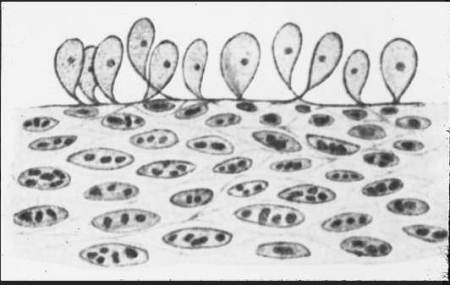| Back to Back Issues Page |
 |
|
The Goldfish Gazette, Issue #126 Spring Illnesses June 28, 2024 |
Goldfish Care TipsA Free Monthly Resource For Goldfish Enthusiasts In This Issue Summer is well under way in the Northern hemisphere, and the Southern hemisphere is in winter, looking forward to spring. Spring Illnesses
Costia attached to skin cells of a fishThe health of your Goldfish in early spring depends on three things:1. Their state of health and fat reserves in late autumn 2. The severity of your winter temperatures 3. Whether your fish are kept indoors or outdoors in a pond. If your fish are kept indoors and fed regularly then spring illnesses are less of a problem, but they can still occur if the fish are in poor health generally. The greatest danger is for pond fish that have been through a period of hibernation, or very low activity and so haven’t been eating for a long period of time. Autumn ConditioningMost animals put on condition (fat) in autumn in preparation for when food is scarce over winter. The more fat they can put on, the better condition they will be in come spring.Goldfish use this fat as an energy source during hibernation and, for egg and milt production in the spring. This is the reason why fish can survive winter, but then die in early spring as they try to get into breeding condition. It’s nature's way of thinning out the fish that haven’t been able to put on enough fat for some reason. This shouldn’t occur in a controlled environment such as a pond, but if the breeding conditions in the pond are ideal in spring, by autumn there may be many new fish that need to be fed. PathogensThe reason illnesses occur in early spring is because of a timing problem.Bacteria and protozoan parasites such as Costia become active at far lower temperatures than Goldfish. As an example, at 10oC (50oF), Goldfish have little appetite and aren’t very active. Costia is rapidly reproducing at this temperature and looking for a host. Before you have time to build up weak fish, they have been attacked. Some of the more common pathogens we see in spring are: 2. Flavobacterium columnare (Columnaris Disease): This bacterial infection can cause lesions, ulcers, and fin rot. The ideal temperature for Columnaris disease is 15 to 35oC but can grow at temperatures as low as 4oC (39oF). 3. Aeromonas spp. (Bacterial Infections): These bacteria can cause ulcers, hemorrhagic septicemia, and other systemic infections. This is another bacterial group that has a wide temperature range for growth of 0 to 42oC (32 to 108oF). 4. Saprolegnia spp. (Fungal Infections): These fungi cause cotton-wool like growths on the skin, gills, and fins. This group is tolerant of a wide range of water temperatures, 3-33oC (37-91oF), but is more prevalent at lower temperatures. 5. Costia (Ichthyobodo): This protozoan parasite can cause skin and gill damage, leading to respiratory distress. This pathogen is a major cause of early spring pond fish deaths and it starts producing rapidly at 10oC (50oF). It kills quickly, usually within days. TreatmentsThe good news is that these pathogens don’t like salt in their water. A salinity level of 0.3% or a tablespoon per gallon is often all that is required.Protozoan parasites such as Costia also don’t like Praziquantel based medications. The trick to avoiding these problems is to feed your fish well during autumn, and careful monitoring for disease in early spring. Comments? Ideas? Feedback? I'd love to hear from you. Just reply to this e-zine and tell me what you think, or what topics you want to be covered. Next Month's Topic Saving very sick fishwww.facebook.com/aboutgoldfish |
| Back to Back Issues Page |
